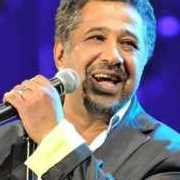Biography
Khaled Hadj Ibrahim (Arabic: خالد حاج إبراهيم, [ˈxaːled ħaːd͡ʒ ɪbraːˈhiːm]; born 29 February 1960), better known by his mononym Khaled (Arabic: خالد), is an Algerian raï singer, musician and songwriter born in Oran. He began recording in his early teens under the name Cheb Khaled (الشاب خالد, Arabic for "Young" Khaled, with "Cheb" as a common title for male Raï singers).
Khaled is one of the most important musicians in the history of Raï music in his native Algeria and is one the world's best-known Arab singers. To date, Khaled has sold over 80.5 million albums (10 diamond, platinum, and gold) worldwide, making him one of the bestselling Arabic-language singers in history.
Among his most famous songs are "Didi", "El Arbi", "Abdel Kader", "La Poupée qui fait non", "Wahran Wahran", "Bakhta", "Aïcha", "C'est la vie", and "Alech Taadi".
At the age of 14, he founded the Cinq Étoiles (Five Stars) band and started performing in nightclubs and at weddings. In the 1980s, Khaled started producing and singing songs in the Raï genre.
His rise to national fame was mainly due to the efforts of Lieutenant-Colonel Hosni Snoussi, director of the state-supported arts and culture Office Riadh el Feth, who took Khaled under his wing and invited him along with other rai stars to perform at the state-sponsored Festival de la Jeunesse pour la Fête Nationale in Algiers in July 1985. In the same year, he was crowned king of rai in the first official festival of rai which was staged in Oran.
Hosni Snoussi and Martin Meissonnier, who met at the Festival, convinced France's Minister of Culture Jack Lang that the export of rai from Algeria to France was in the French government's interest and together they organized the first rai festival in France at Bobigny in 1986. Cheb Khaled, who had been avoiding his mandatory military service, was able to perform at Bobigny only after Colonel Snoussi intervened with the Algerian military authorities to secure him a passport.
Shortly thereafter, Snoussi arranged for Cheb Khaled to record in France, with funding from the Office Riadh el Feth. The album, Kutché, released in 1988, a collaboration between Khaled and the Algerian jazz musician Safy Boutella, expanded his reputation in France, where he soon settled.
Guitarist Steve Hillage produced many of Khaled's career.
By 1986, Khaled (who'd now dropped the Cheb) had been forced to move to Paris, as violence in Algeria claimed lives and he'd been threatened several times (producer Ahmed would, in fact, be murdered, as would several Raï performers). Arriving with a reputation, he attempted to take his music to a global level, although his real debut, Kutche, did him no favors with its jazz-rock arrangements. He fared much better with 1992's Khaled, with some tracks produced by Michael Brook and others by Don Was.
It yielded his first big hit, "Didi" and helped consolidate his reputation as Raï's first superstar. That was firmly cemented the following year with the Was-produced N'ssi N'ssi, which mixed funk, rock, and an Egyptian orchestra behind Khaled's persuasive voice and winning smile for a major commercial breakthrough in France, winning a European, as well as North African, audience.
In 1996, he hit again with Sahra, whose first single, "Aïcha," written for his daughter, gave Khaled a French number one hit. A mix of producers gave varying sounds, with French hip-hoppers Akhenton & Imhotep proving the hardest on the track "Oran Marseille" with its rapid-fire rap. There was even some reggae on "Mektoubi," which merged relatively seamlessly with the North African sound. While well-received critically, it sold little in the U.S. however, unlike France, where the album became Khaled's biggest success.
Perhaps the moment that justified his title of King of Raï, however, came in 1999, when he headlined the 1-2-3 Soleils concert in Paris (which led to the album of the same name), over Rachid Taha and Faudel. It was the biggest Algerian show ever staged in France and left no doubt that Khaled remained Raï's hottest attraction. 2000 brought Kenza and a change of producer, as former prog rocker Steve Hillage helped bring a more organic feel to the proceedings. A smash in Europe, once again it did little business in the U.S.
